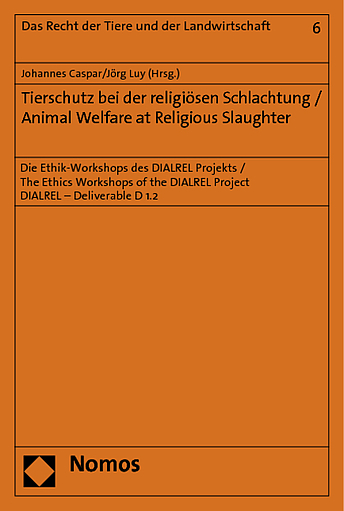englischRanging from the initial veterinary examination to the formulation of an ethically reviewed draft law, this volume documents the two ethics workshops of the interdisciplinary DIALREL project, which is carried out for the EU from 2006 until 2010 regarding the cross-cultural problem of religious slaughter without stunning.
For the first time the documentation of Workshop 1 provides an ethical analysis of the various statutory exemptions for religious slaughter without stunning in Europe (Halal Slaughter and Shechita). Workshop 2 served the jurisprudential assessment of the constitutional tension between the fundamental right of religious freedom and the national policy objective of animal welfare in Germany, and based on both Workshop 1 and 2, also the formulation of draft law for an ethically optimised exemption for religious slaughter without stunning.
The editors who designed and realised these two ethics workshops for the EU with multinational participation, have been dealing with the ethical and legal aspects of religious slaughter for many years.
Dieser Band dokumentiert von der tierärztlichen Befundaufnahme bis zur Formulierung eines ethisch geprüften Gesetzentwurfs die zwei Ethik-Workshops des interdisziplinären DIALREL Projekts, welches für die EU von 2006 noch bis 2010 zum interkulturellen Problem der betäubungslosen religiösen Schlachtung durchgeführt wird.
Die Dokumentation von Workshop 1 liefert erstmals eine ethische Analyse der verschiedenen gesetzlichen Ausnahmeregelungen in Europa für die betäubungslose Form der religiösen Schlachtung (Halal-Schlachtung und Schechita). Workshop 2 diente der rechtswissenschaftlichen Bestandsaufnahme zur verfassungsrechtlichen Spannung in Deutschland zwischen dem Grundrecht der Religionsfreiheit und der Staatszielbestimmung Tierschutz, und sowohl darauf als auch auf Workshop 1 aufbauend der Formulierung eines Gesetzentwurfs zu einer ethisch optimierten Ausnahmeregelung für betäubungslose religiöse Schlachtungen.
Die Herausgeber, die diese beiden Ethik-Workshops für die EU konzipiert und mit multinationaler Beteiligung realisiert haben, beschäftigen sich seit vielen Jahren mit den ethischen und rechtlichen Aspekten der religiösen Schlachtung.


